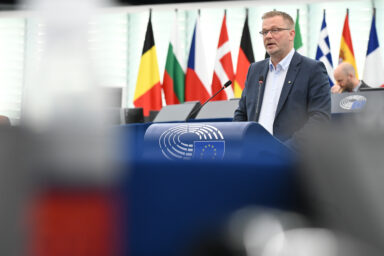While the EU’s Digital Services Act (DSA) dominates talks in Washington and Brussels corridors of power, the majority of Europeans remain unaware of its existence. A recent study reveals that less than one in five Europeans are aware of the regulation, and even fewer feel adequately informed about its provisions.
The CEDO (Central European Digital Media Observatory) conducted the research across nine countries (Czechia, Slovakia, Estonia, Finland, France, Germany, Hungary, Poland, and Slovenia). The survey compiled answers from 25k individuals, with just 20 per cent reporting familiarity with the DSA. Even fewer, 17 per cent, felt adequately informed about its provisions.
Silent law
The study also shows that recognition of national “DSA coordinators”, the authorities responsible for enforcing the law, is patchy at best. In Slovakia, Germany, and the Czech Republic, fewer than a third of respondents could identify the regulator overseeing compliance. In general, awareness was slightly higher among men, younger citizens, urban residents, and frequent social media users, but overall knowledge remained limited.
“A lack of public awareness could potentially facilitate the smooth implementation of the DSA, as it minimises the likelihood of public protest” — Ivan Ruta Cuker, sociologist and data analyst at CEDMO
“A lack of public awareness could potentially facilitate the smooth implementation of the DSA, as it minimises the likelihood of public protest,” says Ivan Ruta Cuker, a sociologist and data analyst at CEDMO. “In Hungary, for instance, the implementation of the DSA sparked a controversy with allegations of governmental misconduct—which, in turn, increased public awareness.” Indeed, Hungary was the country with the highest awareness levels, but still only at 26 per cent.
Despite the lack of familiarity with the DSA, Europeans’ concerns about online risks broadly align with the law’s priorities. People across the continent view content linked to child exploitation, terrorism, and child pornography as highly harmful .
Big Tech cannot look away
By contrast, hate speech, copyright violations, and illegal sales of goods received more mixed responses, reflecting the cultural differences across the continent. “Hate speech is more tolerated in Finland and Estonia, while violations of intellectual property law are viewed more leniently than other offences, especially in Finland and the Czech Republic,” adds Cuker.
If Europeans remain in the dark, Big Tech certainly is not. For global platforms, the DSA has become an unavoidable part of doing business in Europe. Non-compliance on their part can result in fines of up to six per cent of worldwide annual turnover.
You might be interested
Brussels has already moved to enforce the law. Meta is under scrutiny for concerns that its algorithms stimulate behavioural addictions in children. The social network X (formerly Twitter) is under investigation for its approach to content moderation and transparency. TikTok was forced to withdraw its Lite rewards scheme after regulators warned it lacked a proper risk assessment. Even adult content platforms are facing probes over child safety concerns.
Bridging the awareness gap
Experts caution that limited public knowledge poses challenges for enforcement. While low awareness may reduce protest and allow smoother implementation, it can also leave citizens unprepared for regulatory changes and the new rules affecting online platforms. Proper communication should not undermine trust and leave Europeans confused about the protections the law provides.
Launching awareness campaigns would be a good idea. Otherwise, these new regulations could come as a shock to some users, which might result in some pushback. – Ivan Ruta Cuker, sociologist and data analyst at CEDMO
“Launching awareness campaigns would be a good idea. Otherwise, these new regulations could come as a shock to some users, which might result in some pushback,” Mr Cuker emphasises. Without better communication, Europeans may find themselves living under new digital rules without realising how or why they apply.
The DSA paradox
The paradox is clear. Abroad, the DSA has become a lightning rod. In Washington, it is criticised by Republican lawmakers as a threat to free speech, with US President Donald Trump threatening additional tariffs on countries trying to implement it. Yet at home, among ordinary citizens, the law is barely known.
In practice, the Digital Services Act is already shaping how millions of Europeans experience the internet, influencing what content they see and how platforms use their data. But if citizens do not understand the law, confusion could overshadow its promise of protection.











